This site contains explicit writings on kink practices, dominant/submissive relationships, and queer kink erotica (among other things). All characters in role play or non-consent scenes are consenting adults. Content warnings are included.
Interacting with service industry folks—in restaurants, at retail stores, at airports, schools, or health care offices—can be daunting and exhausting for genderqueer folks like me. It is so, so common for me and the group of queer folks I’m with to be referred to as “ladies” (which tells you that I don’t spend a lot of time with genderqueer or cis or trans men, which is true actually, I’m very much in a dyke bubble), and I feel so deflated when that happens.
No, no. It’s not just ‘deflated,’ though yes that’s part of it. It’s also a very real microagression. It’s a very real way that the larger culture, made up of thousands of individuals, gender polices us into binary categories and reminds anybody outside of those categories that we are wrong, unseen, invisible, and unimportant.
This has happened to me for years. It’s kind of related to the thing that happens when genderqueer folks have to pee in public and get hassled in both the women’s or the men’s bathrooms (and there’s a variety of pieces of activism and public awareness happening around that one, too—see, for example, Ivan Coyote’s recent Tedx talk We all need a safe place to pee). But while I can actually hold out and only pee in certain (single-stall) bathrooms, and I can have some control over peeing in public, it’s much harder to just not go interact with any service people, so as to avoid this issue.
Look, I get it. Caring that I’m addressed as “miss” or “ma’am” or that friends and I are called “ladies” sometimes seems like a very small thing on a trans activism scale, especially when so many trans women were murdered in 2015. Sometimes I think this issue of language is a tiny, “politically correct” thing that I should just let go and stop caring so damn much.
And I’ve heard folks say, “Hey, I don’t care if they call me/us ‘ladies,’ because at least they’re being nice to us and not kicking us out of this restaurant.” Which also tells you that I have primarily been queer and genderqueer and visibly different in cities and liberal small towns not so much in places more dangerous to queers.
This issue of gendering groups as a microagression has a certain amount of privilege in it. Absolutely.
And, as someone who continues to move in liberal circles, in large urban areas, in trans- and queer-centered communities, this hurts my feelings. Frequently. Daily.
Gender Perception & Getting a Thicker Skin
Part of the answer, I think, is actually to get a ‘thicker skin’, and I think in general folks who are outside of the mainstream do need to develop a good, solid sense of self, bolstered by community and lovers and theory and random strangers on the internet, to just deal with the reality that not everybody gets us. And for genderqueer and gender non-conforming and masculine of center and feminine of center folks, and trans folks who aren’t exactly ‘passing’ to some cis standard, developing a thicker skin is important. I think we also just need to be very discerning about when we want to offer some education, or feedback, and when we want to just go about our lives. Sometimes it’s exhausting to try to change the world all the time, to come up against gender norms, to fight against the binary system. And sometimes I just need to buy some eggs and get off to my meeting, and who cares what that person sees me as or thinks of me or what words they use.
That’s kind of about “gender perception,” right—the idea that part of your gender identity is how you are perceived by others. (The Gender Book has a great page on gender perception, click on the image in the 4th row 1st column here.) Personally, I’ve struggled with this—not that there’s some way I want to be perceived and am not, but rather I’ve struggled with the idea that what other people think of you matter or should affect one’s sense of self at all. It’s taken me some time to see how important it is, and to go through some of my own identity developments where my identities are then somewhat invisible, and aren’t perceived by others, and to have that really piss me off, has helped me understand how valuable it is at times in people’s lives.
Sometimes, I think how others perceive me is very important. Especially if it’s someone I interact with all the time—my family, my friends, my close community; even someone who works somewhere that I regularly frequent. Those are all important, and I do tend to (eventually) say something about gender, or make a comment about my pronouns. But for the person who is checking me out at the grocery store, or the server at a restaurant I rarely (if ever) go to? Most of the time, I just don’t have the energy to have that conversation. I used to, I suppose, but after more than 15 years of this happening? I just don’t anymore.
Okay wait: a note on class
This kind of misgendering most often happens in the service industry, so I want to write something here about class. I hope we are being aware of the class implications of speaking up or attempting to shift the way a server or service provider is gendering you/us. As a working/artist class person my whole life, I am acutely aware of how we treat folks in the service industry, and I think it’s SO important to enter into conversations with service folks with respect. The amount of pejorative, condescending language and tones that are used with service folks is horrible. And there’s a lot of unexamined privilege in folks who have never really been in a service position, or who have been out of the service industry for a long time. They’re a person, you’re a person. So I just want to encourage us all to watch our conversations here, and to do some examining about what we think of the service industry, and to ask ourselves if that’s really true. (For example: That everyone who works there isn’t smart enough to get a job anywhere else, or must have failed at other jobs, or must not be very good at anything. Probably none of those are true, but they are common stereotypes about service folks.)
Also: as a genderqueer/GNC person, I know that I don’t always have the patience and clarity it takes to interact in moments of microagressions with lots of respect and precision. I just don’t—sometimes I snap and it comes out yucky. Which is another reason, I suppose, why I’ve kind of stopped speaking up in most of these moments of misgendering—because I don’t want to be rude to someone who is just doing their job.
But sometimes, I do want to say something. And I do love how there are some new options (I’ll get to that in a minute, I swear—down at the bottom of this post) for conversations and becoming more aware of gendered language.
Ultimately: I want to strive for respecting folks when I am consuming their services, and be aware of the class implications.
Oh hey, here’s another question: I assume servers at restaurants and cashiers at shops aren’t trained to say “ladies” and “guys,” right? I’ve never actually been a server (though I’ve been a cashier for many years), so I’m not totally clear. It’s so SO so prevalent in the restaurant worlds that sometimes I think it must be in the handbook! But maybe it’s just in the culture? Unspoken, uninforced, but somehow we all absorb it? I’m curious about that.
Download the Gender-Neural Language Sheet
So this is a new possible way to interact with this service/misgendered language issue: the Queer Resource Center in BC adapted a card into a “gender neutral language sheet”, and you can download them for free here.
Toni Latour released “Hello There” cards earlier in 2015, in collaboration with Jenny Lynn and James Alexander Kelly. She’s not the first person I’ve heard who had this idea—in fact, when I first saw the image, I thought, drat, I wasn’t fast enough. I’ve had this thought many times, and I even remember sketching up a draft of it in Oregon on a road trip with rife in 2013. But Toni Latour is the one who made them and printed them up.
And now, the BC Queer center adapted Latour’s “Hello There” cards to be more inclusive and less “ladies” specific. Latour’s cards read:
The revised cards from QBC read:
A note about “guys.”
A lot of folks have said that they use “guys,” and that that is gender neutral. I just want to go on record and say that I disagree, actually, it is not. I do understand that in this culture, we very often hear groups of various gendered people referred to as “guys,” and that it’s presumed to include everyone in the group, not just the young-ish men. I do understand that it is intended to mean “everyone” or “people” or “hey you folks over there.” However, in the realities of language, it is not neutral: it is masculine.
That this society treats the masculine, the male, the man, as the default and indeed as the ‘neutral’ is precisely one of the most sexist issues at play here. When something as fundamental as our language says that men are the norm and the default, and women are the other and the strange, then it affects every other aspect of our culture, too. (There are many writings and resources on this concept out there, I’m sure … I remember studying it extensively in language & gender studies classes in college in 2002. I’m not sure where to point you for more on it, though. Anybody have a good resource to recommend?)
I can often default to calling everybody “guys,” especially when talking to masculine of center queers and genderqueer folks, but I try not to. It’s inaccurate, and frankly it perpetuates the notion that masculinity is the norm, and I don’t want to do that. But, I’m a total nerd about language and gender, so I know that not everybody wants to do that kind of work on how they see the world and interact with words. I’m hoping, though, since you are still reading, that you have that interest and intention.
On Standing Up for Someone Else
Funny enough, this whole thing just happened this weekend, when the server referred to our table—two butches and a femme—as “ladies,” and I had a similar conversation about what we can/should do about it. The femme who was there asked us what our reaction was to it, and if it felt appropriate for her to say something, which I really appreciated. Honestly, when I’ve been in mixed gender groups, often it’s the folks who do not identify as ‘ladies’ who speak up the least, and sometimes having someone else speak up on my behalf makes me feel even more tired and exhausted and segregated and spotlighted—which doesn’t feel good. I think it has in the past made me feel very taken care of, and protected, but these days, it makes me feel annoyed and too singled out to have someone say something on my behalf.
I mean, if you want to speak up about this because it bugs you, by all means please do so, and I got your back. But if you want to speak up because you think that I am insulted and deflated and am now reacting to a microagression and want/need/would appreciate someone else speaking up for me, please don’t.
So if you’re someone who wants to speak up on behalf of someone else, perhaps you could just check in with them and make sure that you are acting in their best interest, and not just projecting your discomfort onto them.
Is this conversation completely among trans/masculine people?
I’m glad that the edits between the first “Hello There” cards and the new Gender Neutral Language Sheet have moved from being less lady-centric, but it makes me wonder: How does this happen in the service industry for folks who are not masculine of center or trans masculine? I imagine similar things happen, getting addressed as “gentlemen” or “guys,” but maybe not? I’ll have to ask around and see what I can find about that.
Most of the dialogue that I’ve seen already around this is dominated by trans masculine folks, so I wonder how we can take up a little less space and ask more questions and talk about this in ways that are relevant to other folks. Or maybe it’s just a very trans masculine issue, and there’s nothing wrong with that really—it just could mean that the conversation is a bit different.
Regardless, I’m curious about why this is so centered on masculinity, and if that’s because of old fashioned sexism and overvaluing the masculine (which is my guess). Still gathering more data about this.
I’m also curious about server’s experiences of this, if you all have been corrected and what you’ve done about it, and where that form of address comes from.
This is not a conclusion
This is not the end of my thoughts about this, but it’s a start. I am curious to see these cards gaining in popularity and making the rounds, and glad to see a second version of them made. I definitely plan to carry some around with me.

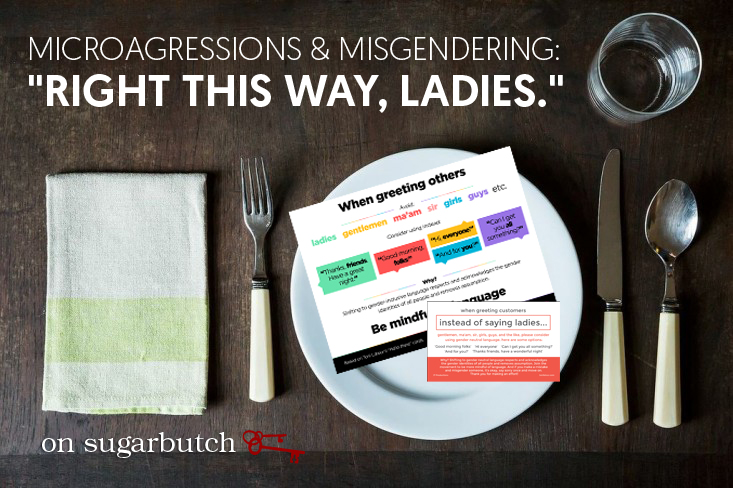
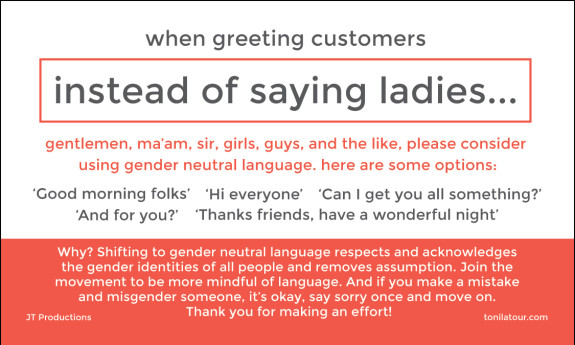
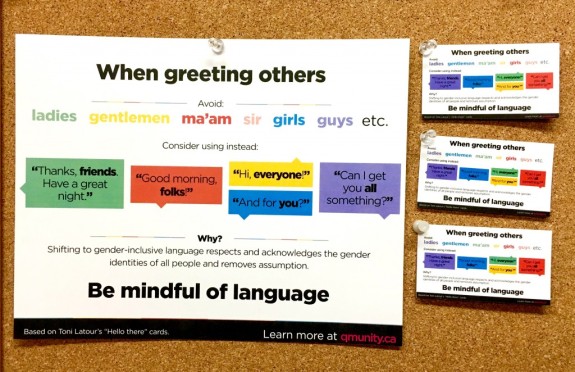
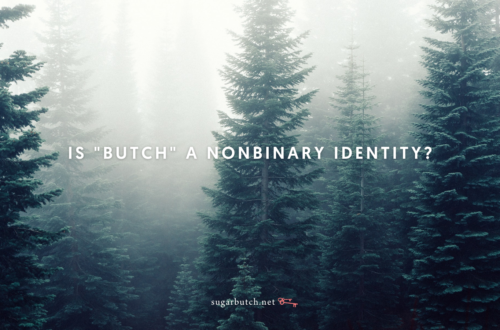
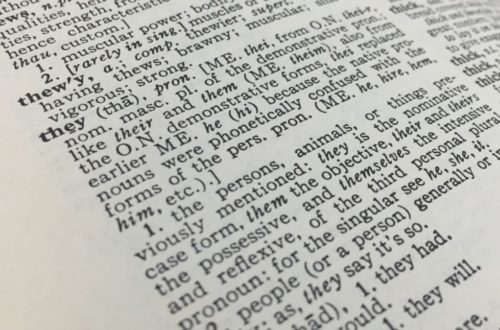
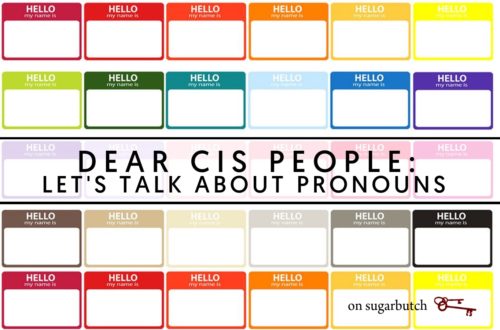
“When something as fundamental as our language says that men are the norm and the default, and women are the other and the strange, then it affects every other aspect of our culture, too. (…Anybody have a good resource to recommend?)”
“The Mismeasure of Woman” by Carol Tavris deals with this extensively. I haven’t read it in years and it may possibly be a bit outdated (published in 1993), but I recall it as an easy read.
“I assume servers at restaurants and cashiers at shops aren’t trained to say ‘ladies’ and ‘guys,’ right?”
Never at any of my jobs, no. But I am of a certain age and live in the South, so I was raised that it’s polite/gracious. It is definitely a cultural thing. The bonus(?) to working in service in the South is you get a bunch of neutral options that aren’t appropriate elsewhere — honey, sweetie, darlin’, etc. — which comes with a different set of pitfalls but does sidestep gender.
I work in the service industry in the South, but my parents are from California so my influences are pretty different despite growing up here. I tend to take honey, sweetie, etc. as gendered, as feminizing, in most cases, although they’re the worst when directed at me by older men and I’m the one behind the counter. I try to take them as not that when coming from woman-presenting folks. For context, I’m a very femme trans boy, so while I related to a lot of these issues I think my way of handling it is different, and I tend to self-blame, feeling like I’m guilty of causing a person to misgender me because I was in a makeup mood or my hair wasn’t short enough (to name a few).
I’ve seen this issue addressed several times before, but I agree with you that it always seems to come from the trans masculine side. I have a close friend who is very androgenous in appearance, and therefore is often misgendered, but she identifies as a woman (and not butch, although most people would assume she identifies that way). After having conversations about it (mostly because I feel very frustrated for her that she is sometimes uncomfortable in the women’s restroom), I gather that this misgendering does not bother her other than re: the bathroom issue.
I, on the otherhand, got dealt the genetics that dictate no matter how I dress, the most androgenous appearance I can achieve is tomboy. I identify as agender, and really wish that my appearance could better reflect that. I almost long to be perceived as male, or moc, or at least have people do a double take before choosing pronouns for me. I am not sure where this falls into the micro aggression scale, but I find it ironic that because of a trick of fate, our perceived genders and real genders have people guessing the wrong things about us.
To answer at least one of your actual questions, I work in the service industry. Some restaurants do train their employees to use gentlemen and ladies, usually more upscale restaurant. But I think a large part of it is culture. We are not really trained to be nice to people, it’s considered a given. So, if one perceives addressing people in that way to be polite it is possible that they will do so of their own volition.
For my part, (and likely because of my own experiences) I never assume gender. I address people by saying “hello there,” or just “good [daypart]!” in my line of work, we ask for people’s names, and I make a point to never react (this is not just for gender variant folks, but people with an ethnic/not English or uncommon names as well) because no one should feel ashamed by their name or like it’s an annoyance.
I tend to use “guys” as a neutral phrase to refer to a group of people, but I haven’t thought about it in the way you described above before. Maybe it’s time to convert. I appreciate the insight.
Also, I know this is already an epic comment, but I just wanted to thank you for sharing yourself here. I have been reading through your archives for a few months now, and have found your way of thinking about things and processing life to be insightful and reassuring while I have been processing my own gender and dealing with some heartbreak. I mean, I like the other stuff too, but your posts on those two topics really helped me when I was needing a new perspective.
Discourse = violence. I honour your pledge to “care so damn much”.
You know (of) me from classes of yours I’ve taken. I really value your thoughts and articulateness, but yes, I think the issue of which you complain is more of a trans masculine issue. But as I said on your Facebook page, I’m bothered that with the rise of non binary identities comes an erasure of binary identities – or it can. I want to be gendered female, and every time my wife and I go to a place and we’re called “folks” or “guys” it makes me feel just like you feel. It’s a comment on my appearance, but honestly, am I ready to call it a micro aggression? It becomes another erasure, to me. And I am not really sure how to handle it or what the answer is, but I do know I’m troubled by what at times seems like the zero-sum nature of these issues. I posted something along the lines of what I said above on tumblr, and said: I don’t want to erase your non binary identity, but please don’t erase my binary identity, and got a reply: “but the binary isn’t real.” AKA privileging one identity over another. I think that is a real mistake.
Thanks for bringing that up, Mina … it makes sense that going with “folks” or “friends” could feel erasing, especially when other tables full of (cis) women are called “ladies” or gendered in the binary. I value your thoughts and articulateness too, thanks for sharing yours here …
I definitely don’t want to privilege one identity over another. I think this is similar to the response I’ve seen when some folks say, “Let’s just call EVERYBODY they/them pronouns!” … because no, for plenty of people, they/them isn’t right, and they do fall into one of the binary categories, either happily or intentionally or unexamined-ly (or all three).
No idea what the solution is here. Maybe there isn’t really one. But thanks, for the thoughts, and for reading.
Thank you for the response. Yes, I was talking to my wife (cis female, able to appear anywhere on the spectrum from MOC to high femme, because she’s awesome like that) about it, and she kind of feels like there’s no real good answer.
I’ve seen some people here in the PDX area wearing buttons with desired pronouns. At first I thought, forget that, but I don’t know.
One thing that does make me a little sad – a lot sad – is that here, as with most things, it feels like the “losers” are going to be non-traditionally pretty / handsome binary id’d trans people. the pretty and the handsome who are binary id’d will get gendered correctly. I think that the over time, with posts like yours and others, most servers and so on will decide it’s just easier to “they” and “folks” everyone else; the non binary id’d will be happy, and guess who ends up holding the (deflated) bag? same people as always.
I’m curious, if you’re still around and feel like engaging Mina, if you’d feel erased if you knew that servers weren’t using these gendered terms for any of their customers, not just selectively using neutral ones for people they thought might not be completely cis.
For me, picking out and making a show of any stranger’s gender has always felt sort of uncomfortable and weird, but I may have a bit of non binary bias even though that’s not a term I tend to want to claim for myself.* I’ve never really used gendered terms where a non-gendered one was easily available, even before I had any real awareness of non binary people. In a lot of circumstances, it would feel to me like a reminder to people to act out their roles, and even if those roles actually fit them (or me, hearing them), that feels inappropriate like deliberately evoking stereotype threat.
I can though how gendered wording would provide valuable feedback about how someone is perceiving you, as someone who’s claim on your womanhood is not always granted automatically or willingly. I can see how that would apply even if people used the gender neutral terms for everyone and how the loss of it would be much more of a burden on binary trans people than on cis people who have their gender affirmed all the time, usually without anyone really noticing.
I can also see how it might feel as if you were being denied acknowledgement and support–that you’re trying to send a message with your presentation while at the same time another group is telling people not to assume they can read that message no matter how clear you are able to make it.
And of course in reality, a lot of times you wouldn’t know if everyone was getting neutral terms or only people the server read as somehow ambiguous
Are those more or less the problems, or am I missing something important? Are you saying that gender neutral terms like “folks” feel not like a missed opportunity but actually wrong for you? Do they feel like a misgendering rather than a non-gendering? That’s harder for me to wrap my head around, but I’m trying. Really don’t know what to do about it even if I can, but sounds like you’re not really sure either.
*Assigned female, definitely identifying as a woman, but with certain bits of the expected palate of femininity feeling really really dissonant (“miss” and “lady” being squarely in that camp) and fairly fluid in terms of expression.
Hey, thanks Mina. I appreciate your thoughts on this. It’s complex! And clearly not as simple as just “call everybody this one thing” and now everybody feels okay.
So my understanding is that it feels crappy for you not to be seen as female/feminine, and that sometimes you aren’t in these (service) contexts. That totally makes sense to me, especially when everybody else gets gendered.
I’ve noticed this happens to me sometimes when I’m getting on an airplane … everyone in front of me gets, “Welcome aboard, miss,” or “Thank you, sir,” but they get to me and just say, “Have a nice flight” or etc. Honestly, I don’t mind this, because it feels like it affirms my in-between gender. But it totally makes sense that with a more binary identity, that feels invisibilizing.
But I am curious: If the system defaulted to gender neutral, would it still feel like you weren’t seen? Because there is a system in place that puts people into one or the other of the binary genders, it makes sense that when you get put in between (or in the wrong one) that that sucks. But if *everybody* was put in neutral terms, would that still feel bad?
I get that sometimes this part of the gender perception is super validating, so maybe, if it was all neutral, it would take away a piece of that validation. That could be a real loss, so I don’t want to make light. But I still just don’t know how else to advocate for this situation, where there are so many people being so misgendered so constantly.
As a server, I LOVED Mina’s comment, because it illustrates beautifully how difficult it can be to navigate these social subtleties. The golden rule doesn’t apply in 2015, because when you treat someone the way YOU want to be treated, you’re assuming that everyone shares your values and priorities.
Ultimately, service workers are really just trying to do a job. There is no agenda, and no aggression, micro or otherwise, intended in how we address guests. It’s an imperfect system we work in, one based in outdated customs and further hampered by the ineptitude of language. I’m not a mind reader, and even if I were, the onus of expectation and explanation doesn’t lie with me. I cannot and should not be expected to constantly anticipate how men, women, or nonbinary individuals wish to be addressed. It’s a lot easier for you to speak up and ask for what you want than it is for me to figure it out on your behalf. If you know of yourself that your identity requires clarification on the part of others in order to make you feel comfortable, then by all means communicate that. But please, understand that, more than in any other industry, when things don’t go your way in a restaurant setting, its really, truly never personal. Its just not. If more guests understood this, we’d all be a happier and more harmonious society.
I totally agree with you. This is what I was trying to get at, though I think you articulated it better than I did. This part: “I cannot and should not be expected to constantly anticipate how men, women, or nonbinary individuals wish to be addressed.” — Yes. I totally agree with that.
And, isn’t that an argument for using very gender neutral language? For using very unassuming language? Because one can never really know what genders are correct, or what words are the most honoring to address individuals. So I think this is precisely why we should default to much more general words.
I agree that service workers are just trying to do a job. I’m not sure I do agree that it’s not a microaggression, however. I understand that it’s not necessarily an aggression on the part of the servers … so maybe we have different definitions of microaggression? I think a microaggression can be unconscious or subconscious, or completely unintentional.
Thanks for that, though. I’ve been thinking about it. Still no idea what the answer is, because maybe there isn’t one. But I appreciate the thoughts.